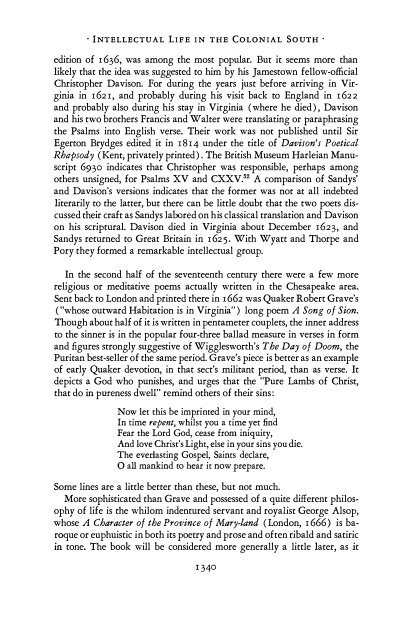Literature, Principally Belletristic - University of Tennessee, Knoxville
Literature, Principally Belletristic - University of Tennessee, Knoxville
Literature, Principally Belletristic - University of Tennessee, Knoxville
Create successful ePaper yourself
Turn your PDF publications into a flip-book with our unique Google optimized e-Paper software.
• INTELLECTUAL LIFE IN THE COLONIAL SOUTH '<br />
edition <strong>of</strong> 1636, was among the most popular. But it seems more than<br />
likely that the idea was suggested to him by his Jamestown fellow-<strong>of</strong>ficial<br />
Christopher Davison. For during the years just before arriving in Virginia<br />
in 1621, and probably during his visit back to England in 1622<br />
and probably also during his stay in Virginia (where he died ), Davison<br />
and his two brothers Francis and Walter were translating or paraphrasing<br />
the Psalms into English verse. Their work was not published until Sir<br />
Egerton Brydges edited it in 1814 under the title <strong>of</strong> Davison's Poetical<br />
Rhapsody (Kent, privately printed). The British Museum Harleian Manuscript<br />
6930 indicates that Christopher was responsible, perhaps among<br />
others unsigned, for Psalms XV and CXXV.52 A comparison <strong>of</strong> Sandys'<br />
and Davison's versions indicates that the former was not at all indebted<br />
literarily to the latter, but there can be little doubt that the two poets discussed<br />
their craft as Sandys labored on his classical translation and Davison<br />
on his scriptural. Davison died in Virginia about December 1623, and<br />
Sandys returned to Great Britain in 1625. With Wyatt and Thorpe and<br />
Pory they formed a remarkable intellectual group.<br />
In the second half <strong>of</strong> the seventeenth century there were a few more<br />
religious or meditative poems actually written in the Chesapeake area.<br />
Sent back to London and printed there in 1662 was Quaker Robert Grave's<br />
("whose outward Habitation is in Virginia" ) long poem A Song <strong>of</strong> Sian.<br />
Though about half <strong>of</strong> it is written in pentameter couplets, the inner address<br />
to the sinner is in the popular four-three ballad measure in verses in form<br />
and figures strongly suggestive <strong>of</strong> Wigglesworth's The Day <strong>of</strong> Doom, the<br />
Puritan best-seller <strong>of</strong> the same period. Grave's piece is better as an example<br />
<strong>of</strong> early Quaker devotion, in that sect's militant period, than as verse. It<br />
depicts a God who punishes, and urges that the "Pure Lambs <strong>of</strong> Christ,<br />
that do in pureness dwell" remind others <strong>of</strong> their sins:<br />
Now let this be imprinted in your mind,<br />
In time repent, whilst you a time yet :find<br />
Fear the Lord God, cease from iniquity,<br />
And love Christ's Light, else in your sins you die.<br />
The everlasting Gospel, Saints declare,<br />
o all mankind to hear it now prepare.<br />
Some lines are a little better than these, but not much.<br />
More sophisticated than Grave and possessed <strong>of</strong> a quite different philosophy<br />
<strong>of</strong> life is the whilom indentured servant and royalist George Alsop,<br />
whose A Character <strong>of</strong> the Province <strong>of</strong> Mary-land (London, 1666) is baroque<br />
or euphuistic in both its poetry and prose and <strong>of</strong>ten ribald and satiric<br />
in tone. The book will be considered more generally a little later, as it<br />
1340















